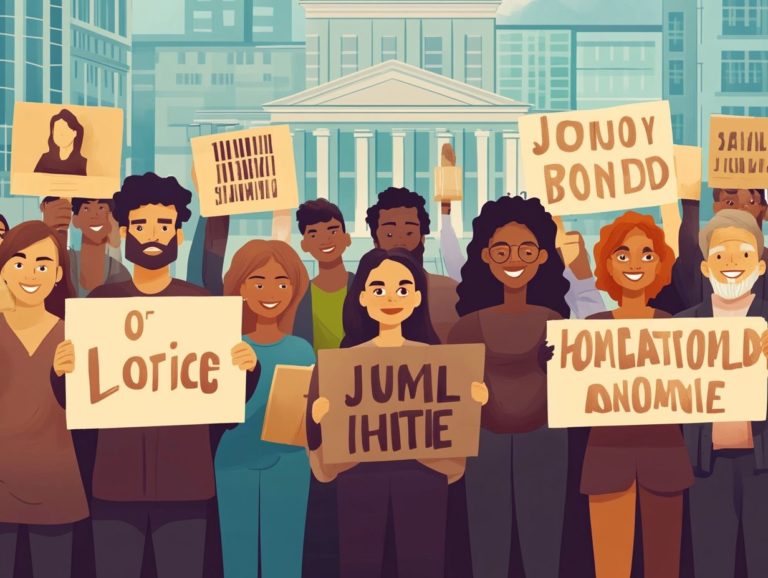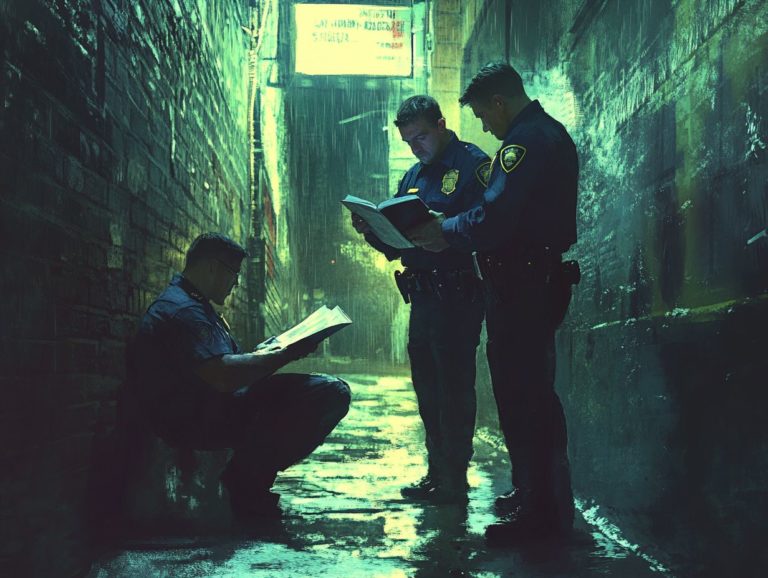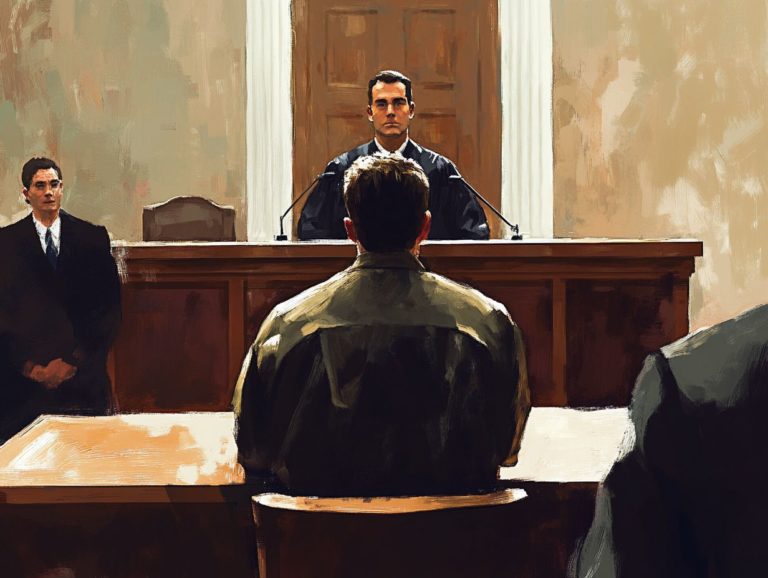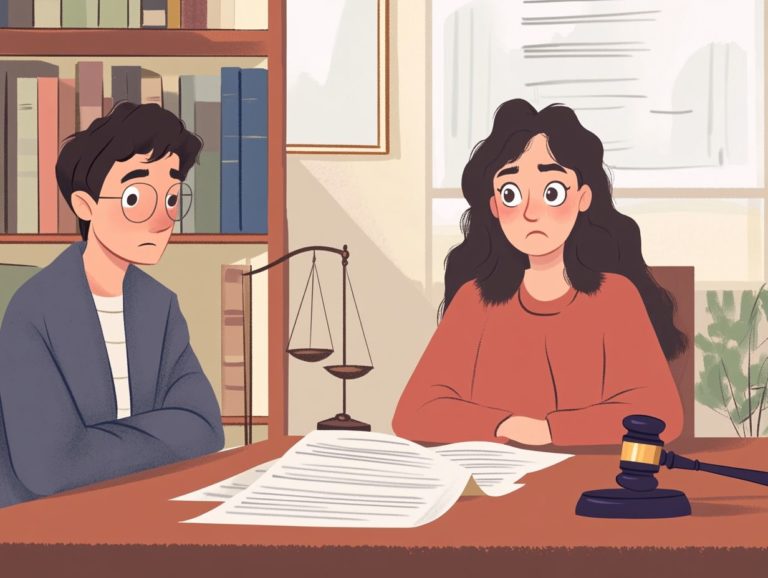Your Rights in Hate Crime Charges
Hate crimes extend far beyond mere acts of violence; they are manifestations of deep-seated prejudice and intolerance that profoundly impact both individuals and communities.
This article delves into the intricate landscape of hate crime charges. It offers insights into their definitions, the rights that victims and defendants possess, and the legal protections designed to safeguard them.
It outlines important steps for reporting hate crimes and emphasizes the essential role of education and advocacy in preventing such acts.
Engage with us as we navigate this critical subject, equipping yourself to seek justice and inspire meaningful change.
Contents
Key Takeaways:
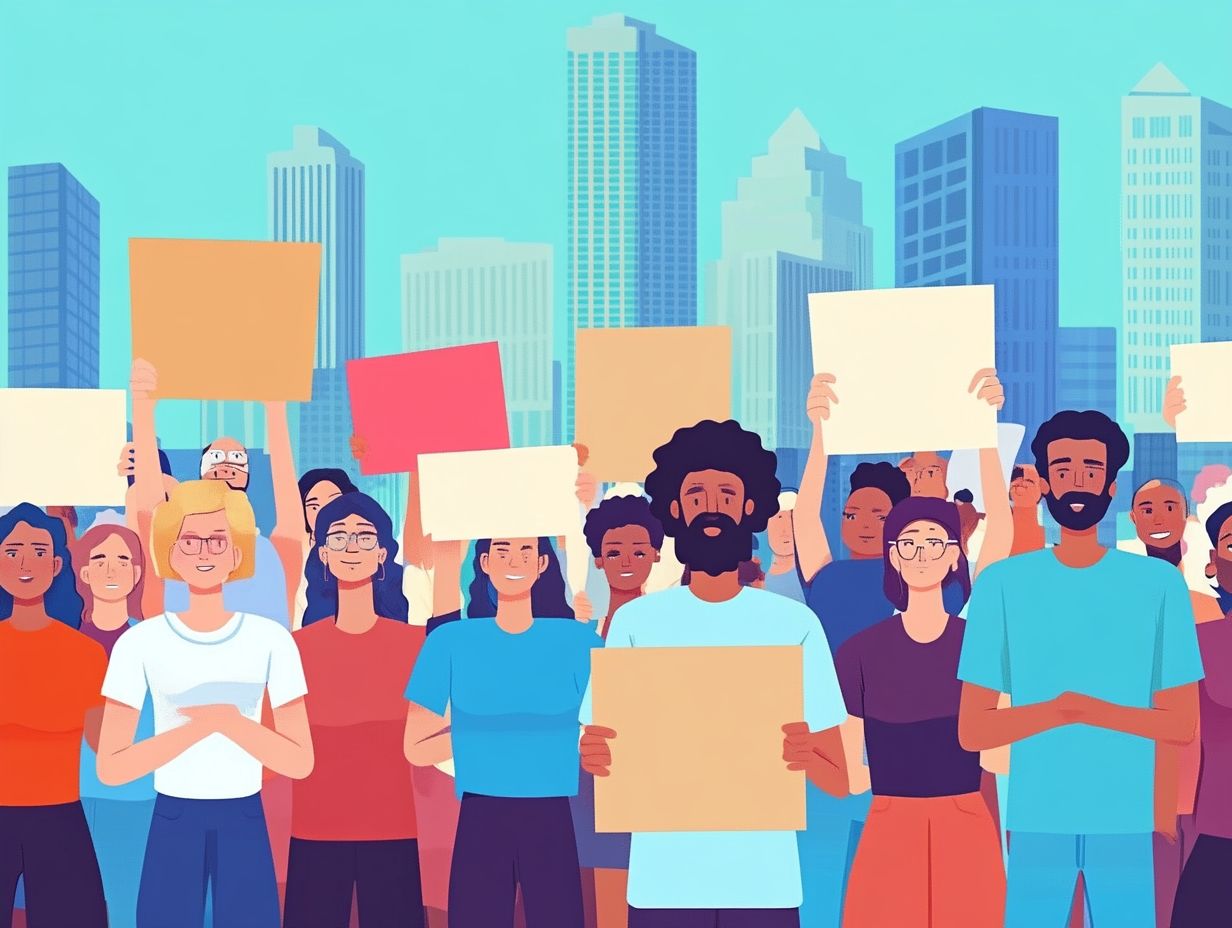
- You have the right to seek legal help.
- As a victim, you can access resources to help you recover from the incident.
- When facing hate crime charges as a defendant, you have the right to legal defense to ensure a fair trial.
- Report hate crimes to prevent future incidents.
- Education can help stop hate crimes.
Understanding Hate Crime Charges
Grasping the nuances of hate crime charges is crucial for both victims and defendants. It involves understanding the laws that differentiate between hate speech words or actions that attack individuals based on their identity and hate crimes, which are criminal offenses.
While the First Amendment offers robust protections for free expression, it does not protect actions deemed as hate crimes from prosecution. These offenses often arise from an offender’s bias against specific groups based on race, ethnicity, religion, or sexual orientation.
Understanding this distinction can help you better navigate the legal landscape.
Definition and Types of Hate Crimes
Hate crimes are defined as criminal acts driven, in part or in whole, by the offender’s bias against a specific group. This can include hate speech and physical violence, as well as vandalism, threats, harassment, or assault.
These insidious acts target people based on characteristics such as race, religion, sexual orientation, or disability, causing deep pain and fear not just for the victims but also for the wider community. High-profile cases, like those of Matthew Shepard and James Byrd Jr., starkly illustrate the brutality and severity of these crimes, sparking public outcry and advocacy for necessary reforms.
The statistics surrounding hate crimes reveal a troubling upward trend, underscoring that the prevalence of such incidents is a pressing issue in society. The range of criminal behaviors linked to these offenses highlights the urgent need for heightened awareness and proactive measures to combat bigotry in all its forms.
Your Rights as a Victim of Hate Crime
If you have endured a hate crime, it’s essential to fully understand your rights. These rights are protected by various legal frameworks specifically designed to support victims like you and provide pathways to justice.
Laws combating discrimination explicitly prohibit hate crimes, ensuring those who perpetrate such acts face accountability through criminal prosecution.
Legal Protections and Resources

Legal protections for victims of hate crimes are designed to ensure your safety and assist you in seeking justice. They encompass various laws and resources that address discrimination and provide legal avenues for support.
These protections include effective reporting mechanisms, allowing you to report incidents safely to the appropriate authorities, such as local law enforcement or the Department of Justice. You are encouraged to reach out to advocacy groups that specialize in supporting individuals affected by hate crimes.
Organizations like the Office for Diversity serve as invaluable resources, guiding you through the complex legal landscape and helping you navigate discrimination laws to pursue reparations and accountability. By utilizing these channels, you can gain a clearer understanding of your options and secure the support you truly need.
Your Rights as a Defendant in Hate Crime Charges
If you are facing hate crime charges, it is crucial to understand your rights as a defendant. These charges carry serious consequences, including potential criminal prosecution.
Navigating the complexities of the First Amendment can significantly impact your legal defense strategy. It is vital to understand how these legal aspects connect in your situation.
Legal Defense and Protections
Legal defenses against hate crime charges often depend on how the First Amendment is interpreted. This provides avenues to challenge the prosecution’s case based on protected speech while addressing criminal prosecution related to crimes motivated by prejudice against a person’s race, religion, or other characteristics.
Understanding this legal framework is essential, especially since federal and state laws can differ significantly.
Defendants often argue that their actions were mischaracterized as hate crimes, especially under the scrutiny of the FBI and the Department of Justice, key players in investigating these offenses.
Legal experts emphasize grasping these differing standards, as one misstep could lead to severe repercussions. Therefore, consulting a qualified attorney who specializes in these matters can be invaluable in navigating the complex legal landscape surrounding hate crime allegations.
Reporting and Seeking Justice for Hate Crimes
Reporting hate crimes is vital. It helps ensure justice and holds offenders accountable!
By reporting, you not only assist law enforcement in compiling crucial statistics on hate crimes but also gain access to support services designed to guide you through the legal process and beyond.
Steps to Take and Available Support
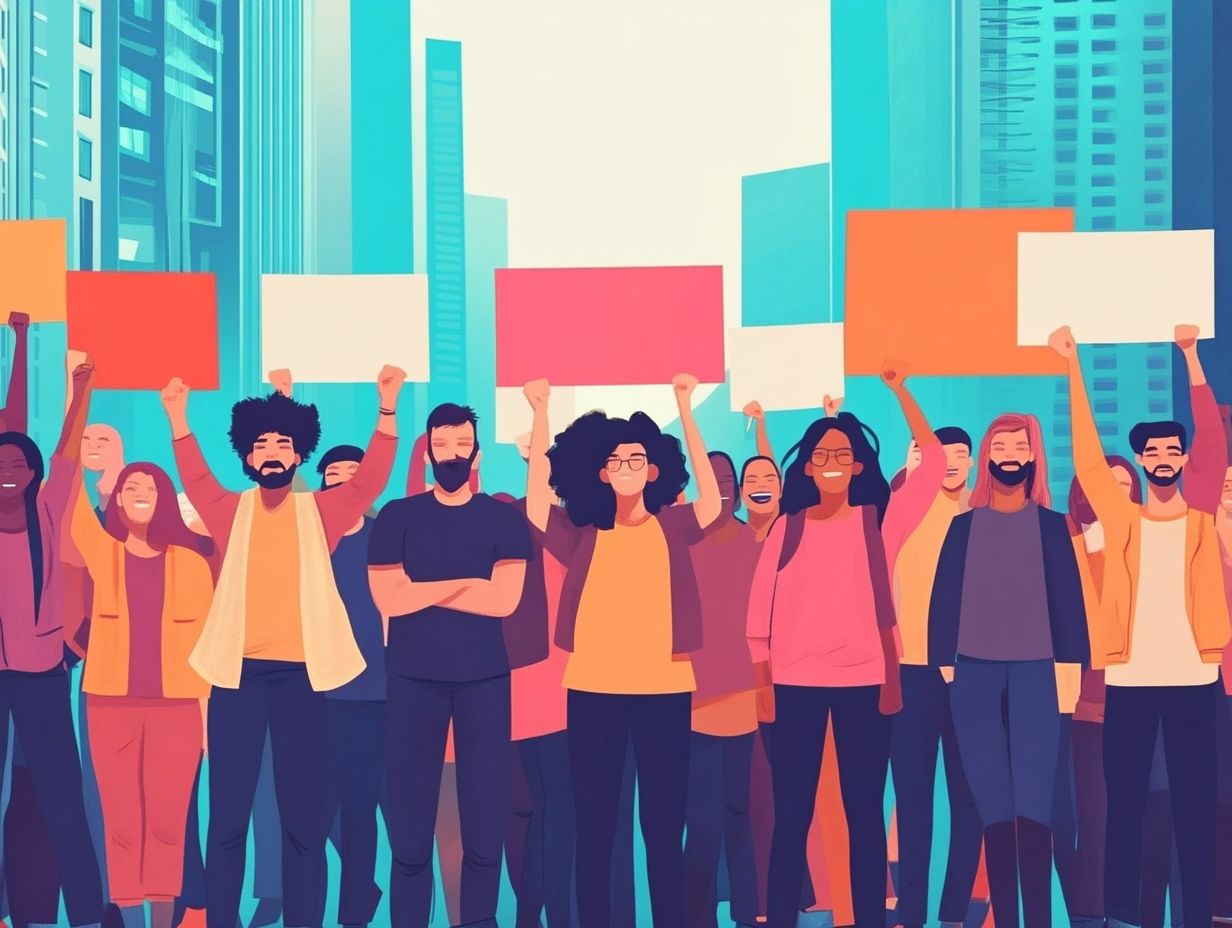
If you or someone you know has experienced a hate crime, it s essential to take proactive steps toward reporting the incident and pursuing justice.
There are numerous support systems available to assist victims in navigating the aftermath of such traumatic experiences.
- Contact local law enforcement to formally report the incident. Document every detail taking photographs or writing down what occurred can prove invaluable.
- After filing a report, reach out to local organizations like the Human Rights Campaign or the Southern Poverty Law Center. These groups provide vital resources and advocacy for those affected. They can help you understand your rights and the complexities of the legal process.
- Finding a support group can significantly aid your healing journey. Connecting with others who have faced similar challenges offers comfort and understanding, making the path forward less daunting.
Preventing Hate Crimes
Preventing hate crimes requires a comprehensive strategy that prioritizes education and advocacy for meaningful change.
Communities must be well-informed about discrimination laws and understand the importance of fostering an environment that champions acceptance, tolerance, and respect for diversity.
By raising awareness and understanding, you can contribute to a culture that actively rejects hate and embraces inclusivity.
Education and Advocacy for Change
Education and advocacy for change are essential in preventing hate crimes. They empower you and your community to understand the impact of discrimination laws and work toward fostering inclusivity and respect for everyone, regardless of their background.
Organizations like the American Library Association actively champion educational programs that raise awareness about the various forms of hate crimes and their devastating effects on society. By incorporating discussions on these critical issues into community outreach, they inform you about existing discrimination laws while inspiring collective action.
As the 2024 election approaches, many initiatives focus on voter education, highlighting the importance of electing leaders who prioritize anti-discrimination measures. These efforts contribute to creating an informed populace that stands against hate and advocates for policies safeguarding the rights of all community members.
Frequently Asked Questions
Stand up against hate report it and seek the justice you deserve!
What is considered a hate crime?
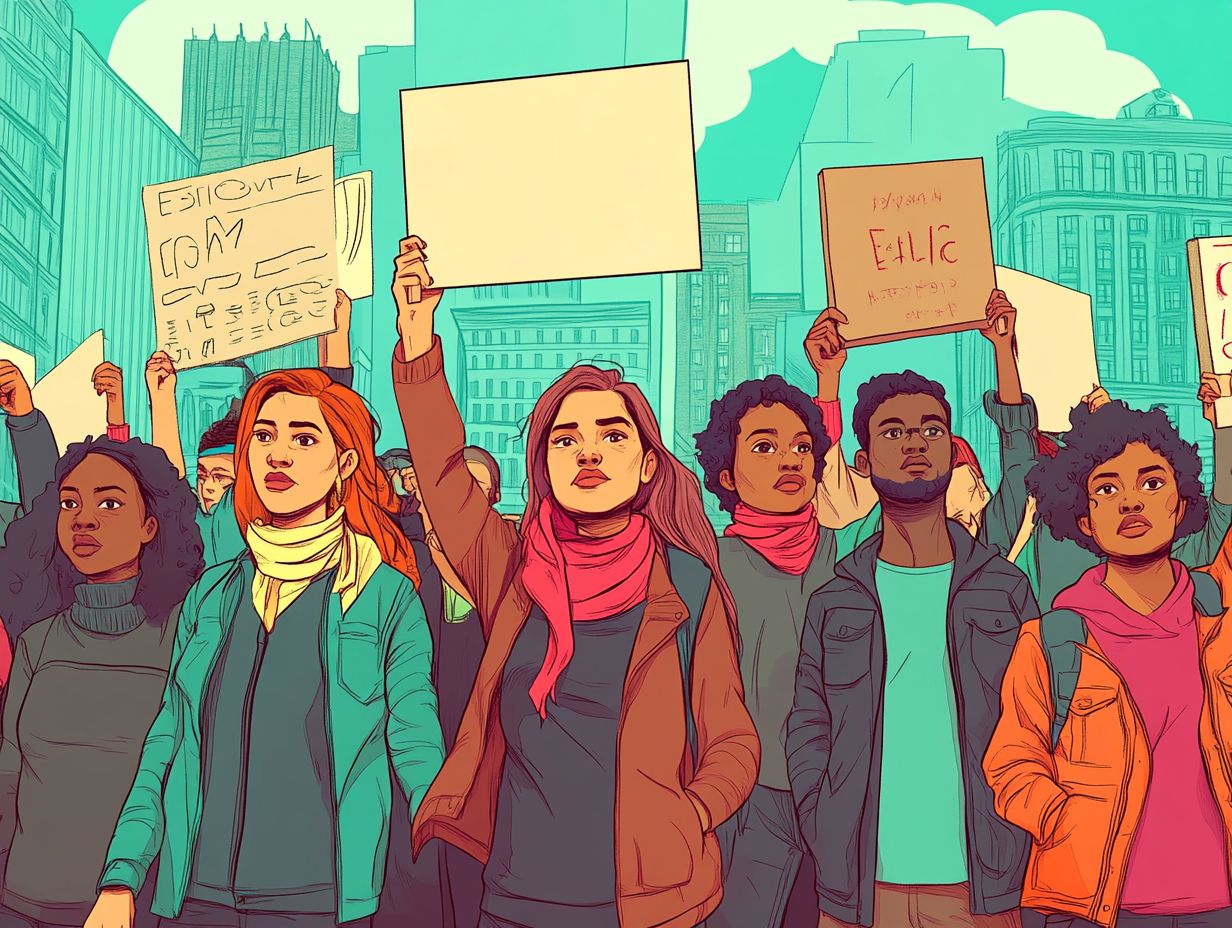
A hate crime is a criminal act driven by bias. This can be against a group based on race, religion, sexual orientation, or gender identity.
What are my rights if I am charged with a hate crime?
If you’re charged with a hate crime, you have the same rights as any criminal defendant. This includes the right to remain silent, the right to an attorney, and the right to a fair trial.
Do hate crime charges carry harsher penalties?
Hate crime charges often lead to harsher penalties than similar crimes without this designation. This is because these offenses are seen as particularly harmful to the targeted group or individual.
Can I be charged with a hate crime for a verbal offense?
Yes, verbal offenses such as hate speech or slurs can be considered hate crimes. These are often labeled as “verbal assault” or “verbal harassment.”
Can I defend myself against hate crime charges?
You can defend yourself against hate crime charges. Presenting evidence, calling witnesses, and having an attorney on your side is your right in court.
What should I do if I believe I am a victim of a hate crime?
If you think you re a victim of a hate crime, report it to the authorities right away. Your voice matters!

